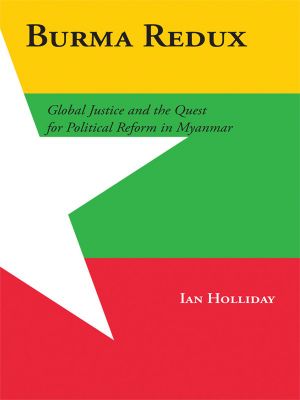Burma Redux

- Authors
- Holliday, Ian
- Publisher
- Columbia University Press
- Tags
- history , asia , general , his003000 , political science , international relations , general , pol011000 , politics
- ISBN
- 9780231504249
- Date
- 2011-01-01T00:00:00+00:00
- Size
- 15.22 MB
- Lang
- en
What should be the role of foreign actors in Myanmar's political evolution?
Contemporary Myanmar faces a number of political challenges, and it is unclear how other nations should act in relation to the country. Prioritizing the opinions of local citizens and reading them against the latest scholarship on this issue, Ian Holliday affirms the importance of foreign interests in Myanmar's democratic awakening, yet only through committed, grassroots strategies of engagement encompassing foreign states, international aid agencies, and global corporations.Holliday supports his argument by using multiple sources and theories, particularly ones that take historical events, contemporary political and social investigations, and global justice literature into account, as well as studies that focus on the effects of democratic transition, the aid industry, and socially responsible corporate investing and sanctions. One of the only volumes to apply broad-ranging global justice theories to a real-world nation in flux, Burma Redux will appeal to professionals researching Burma/Myanmar; political advisers and advocacy groups; nonspecialists interested in Southeast Asian politics and society and the local and international problems posed by pariah states; general readers who seek a richer understanding of the country beyond journalistic accounts; and the Burmese people themselves—both within the country and in diaspora. Burma Redux is also the first book-length study on the nation to be completed after the contentious general elections of 2010.
Contemporary Myanmar faces a number of political challenges, and no one is certain whether external forces should intervene. Prioritizing the opinions of local citizens and reading them against the latest scholarship on this issue, Ian Holliday affirms the importance of foreign interests in Myanmar's democratic awakening, yet only through committed, grassroots strategies of engagement encompassing foreign states, international aid agencies, and global corporations.
Holliday defends his argument using the support of multiple sources and theories, particularly ones taking historical events, contemporary political and social investigations, and global justice literature into account, as well as studies that focus on the effects of democratic transition, the aid industry, and socially responsible corporate investing and sanctions. One of the only volumes to apply broad-ranging global justice theories to a real-world nation in flux, Burma Redux will appeal to professional researchers of Burma/Myanmar; political advisors and advocacy groups; nonspecialists interested in Southeast Asian politics and society and the local and international problems posed by pariah states; general readers who seek a richer understanding of the country beyond journalistic accounts; and the Burmese people themselves, both in the country and the diaspora. Burma Redux is also the sole book-length study on the nation to be completed after the contentious general elections of 2010.